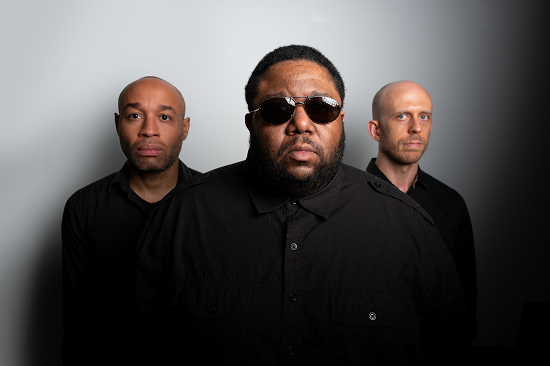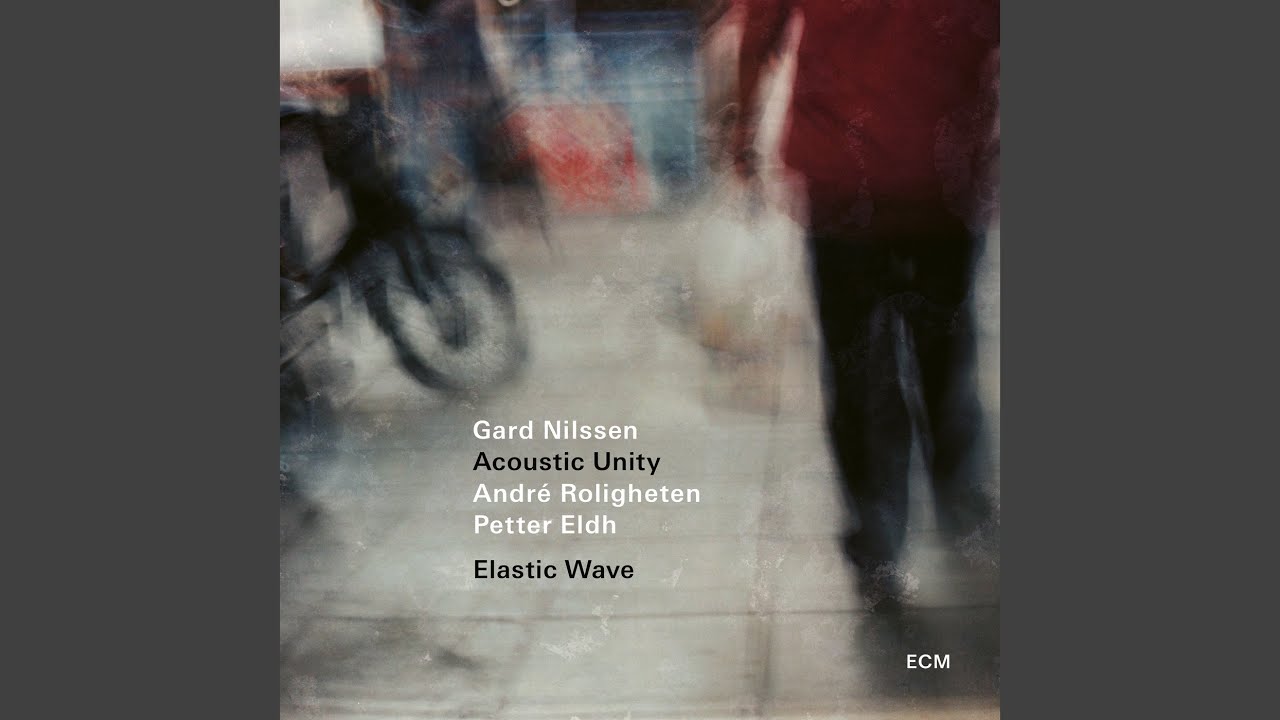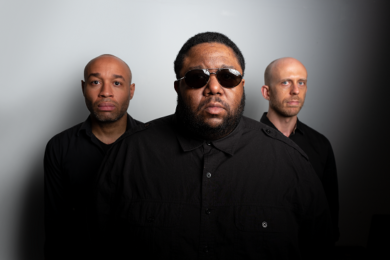Tyshawn Sorey Trio, photo by John Rogers
This column is unabashedly focused on the present, trying to make some sense of the ever-expanding terrain occupied by jazz and improvised music, but sometimes I’m overwhelmed by its roots. There is always more to discover in the present, of course, but month after month I encounter transmissions from the past that are thrilling on their own terms while also informing the present.
I randomly discovered a new batch of reissues from the good folks at Corbett vs. Dempsey the other day, including two albums by the German pianist Georg Gräwe from the mid-1970s. I became a great admirer of the pianist in the late 1980s through his great GrubenKlangOrchester, and I’ve been listening ever since, but I had no idea his discography stretched back so far.
New Movements is a scorching live date from 1976 with three dynamically-proportioned excursions colliding post-bop with free jazz. The band is on fire, especially when they’re all firing at once.
The same band is present on Pink Pong, a 1977 studio session released in 1978—like its predecessor, on the great FMP imprint. I’ve never the members in this killer group—trumpeter Horst Grabosch, saxophonist Harald Dau, drummer Achim Krämer, and bassist Hans Schneider—but under Gräwe’s direction they operate with stunning unity and purpose.
By this point the quintet had really found its identity, even if there’s plenty of febrile action on the first recording. The later album opts for shorter pieces, with explosive improvisations erupting from surprisingly pithy post-bop vehicles, as the band occupies the leader’s compositions with an ensemble-oriented drive.
Both of these albums have already been available as digital downloads from the great Destination-Out Destination-Out, which administers the FMP catalog online. But sometimes it takes a physical object to slap some sense into oneself. Now, let’s move into the present with these ten new jams.
Gard Nilssen Acoustic Unity – Elastic Wave
(ECM)
It’s been three years since we’ve heard from Gard Nilssen Acoustic Unity, Nilssen’s sublime trio with reedist André Roligheten and bassist Petter Eldh that extends the vaunted tradition of the instrumental format as well as any working band on the planet. On the group’s first album for ECM the heat’s been turned down a bit without sacrificing agility and freedom. The new tunes reveal a group that’s continually been stretching out over the years; putting a collective spin on Scandinavian folk — even if it’s imaginary — balancing a simultaneous focus on melodic elucidation and structural ingenuity (as with the heavily composed drum part in ‘Dreignau’), or exalting in the pleasures of Ornette Coleman in 2022 (Roligheten’s churning ‘Influx Delight’). Nilssen’s compositional gifts have never as clear as on ‘Lokket Til Jon, Og Skjerfet Til Paul’ — an obscure reference to drummer Paul Motian — a lilting ballad that oozes admiration for its namesake. ‘The Other Village’ finds the reedist playing twin horns a la Rahsaan Roland Kirk to evoke the sound of bagpipes, while Nilssen’s ‘Boogie’ plays with sudden time shifts, a delightfully gamboling bridge, and upper register tenor cries that summon the spirit of prime David Murray. The trio achieves something different with every piece. They’ve hardly played together over the last few years for obvious reasons, and if they sound this sharp it scares me to think where they could go next.
Amidea Clotet – Trasluz
(Relative Pitch)
Although Relative Pitch Records has long documented improvised music happening in and around New York, it’s also cast a wide net globally, perpetually introducing me to new players. Barcelona guitarist Amidea Clotet is the latest discovery for me from the imprint, and on her solo debut she finds new ways to make noise from her instrument. She’s hardly the first person to use the guitar as a sound generator, but there a bunch of fresh sounds found on Trasluz. On these seven improvisations she deploys a variety of devices to rub and scratch the strings on her amplified instrument, but the tangled astringency of her tones feels unique, even when using something as familiar as a bow. I often forget she’s using guitar here, such as when upper register whinnies suggesting an overblown alto saxophone or thrummed and bouncing bow action evoke a double bass, both on the opening piece ‘A Boca De Fosc’. The brittle snap and twang of aggressively yanked or plucked strings is obvious on a piece like ‘No Ni Ná’ but most of the time the origin of the sounds would be hazy without knowing Clotet is a guitarist. I’ve checked out some duets she’s played with pianist Agustí Fernández where she’s impressively responsive, but this solo endeavor feels like an inspired research session, revealing fresh horizons for exploration. I’m eager to see what she finds.
Tyshawn Sorey Trio – Mesmerism
(Yeros 7 Music)
If you pay attention to the variegated activities of drummer, composer, and bandleader Tyshawn Sorey you know that his wide vision encompasses all kinds of traditions and approaches, but once in a while he lays out specific strands to make sure it’s clear. This new trio documents his ardor and love for jazz standards, which is expansive enough for him to include gems from Paul Motian and Muhal Richard Abrams. He’s joined by the versatile bassist Matt Brewer and pianist Aaron Diehl, perhaps known best for his work with singer Cécile McLorin Salvant. Like Sorey, they also contain multitudes that are often overlooked. The trio had never played together before and it spent two hours rehearsing prior to the session, drawing primarily on shared knowledge and instincts in surveying these compositions. While a couple of pieces deploy some clever tactics — a take on ‘Detour Ahead’ constantly modulates keys, while a reading of Motian’s ‘From Time to Time’ distends and disguises the theme until the final statement — the focus is on how a top-notch working group can transform such durable vehicles in the moment. Great musicians find ways to transform even the most familiar material. For these players, it’s like drawing breath.
Kirk Knuffke Trio – Gravity Without Airs
(TAO Forms)
Cornetist Kirk Knuffke has long revealed an unabashed devotion to jazz and its rich history, whether fronting a band with cool jazz tenor Ted Brown, recording a program of Don Cherry tunes, or forging wry yet soulful contemporary post-bop in Matt Wilson’s quartet. At the same time, he’s a fearless improviser, game to put himself in wide open contexts, whether serving as an invaluable foil to reedist James Brandon Lewis on last year’s Jesup Wagon or playing spontaneous duets with Whit Dickey. This sublime double CD is a drummer-free session with pianist Matthew Shipp and bassist Michael Bisio, who’ve worked together in various groupings, but never as this trio. Half collective improvisations and half Knuffke originals, he brings out the lyrical instincts in his collaborators throughout whether on turbulent dirges or spry post-bop. But that doesn’t mean he plays it safe. In the Francis Davis liner notes essay he says of his aesthetic, “beauty is always first; not in a precious way. It can be a rough way, too.” Nothing has hit me harder than the tender ballad ‘Paint Pale Silver’ whose gorgeous lyric quality is built from changes sculpted by Shipp and Bisio, while Knuffke plays a tender series of long tones through the form. The album is filled with such modest yet devastatingly effective gestures.
Steve Lehman & Sélébéyone – Xaybu: The Unseen
(Pi)
Saxophonist and composer Steve Lehman continues to carve out new terrain with the long-awaited second album from the collective Sélébéyone, a collision of hip-hop and cutting-edge jazz improvisation that stands alone for its rhythmic ingenuity and endlessly surprising sonic material. Antipop Consortium MC HPrizm and Senegalese rapper Gaston Bandimic spit abstract rhymes in endlessly inventive cadences, no doubt propelled by the off-kilter tracks the leader has produced, to say nothing of the jaw-dropping live drumming of Damion Reid whose real-time slice-and-dice can choke any MPC groove that dared take him on. Lehman’s now-sinewy, now-stuttering alto saxophone slaloms with and against the soprano lines of Maciek Lasserre, a kind of parallel presence and counterpoint to the seriously captivating MCs. Lehman has conjured a kaleidoscopic quilt of synthetic patterns, terse samples of contemporary classic music, and other stuff I have trouble identifying, to say nothing of spoken passages of jazz greats Billy Higgins and Jackie McLean describing their musical and spiritual practices (both of whom converted to Islam late in life, the same faith of Lasserre and the two rappers). There’s a powerful use of Japanese gagaku music on ‘Gagaku’, and the ghostly harmonic drones of ‘Liminal’ masterfully conjure that title. After a dozen spins I’m still trying to get my head around the music, but I have no doubt it’s one of the year’s best.
Breath of Air – Breath of Air
(Burning Ambulance)
This exciting new trio exists because of an album made almost four decades ago. Drummer Warren Benbow and violinist Charles Burnham played behind guitarist and singer James Blood Ulmer on his 1983 classic Odyssey, where the lean instrumentation brought out the country and soul in the leader more effectively than at any other time in his long career. Breath Of Air clearly references that music, with guitarist Brandon Ross (of Harriet Tubman fame) conjuring some kind of improvised, stylistically elusive hybrid with Benbow and Burnham. Bypassing the structure of compositions, the trio ebbs and flows as one, as rhythms slacken and coalesce, density thickens and thins, and sonic landmarks shuffle, always remaining seductively amorphous. These five extended jams dance around the timbre of Odyssey, but there’s no danger of getting them mixed up. Ross has a smoother, more explicitly psychedelic attack that Blood, and with Burnham’s amplification there’s an almost silken middle range bubbling atop Benbow’s springy pulsations. Even when they all play rhythmic patterns at once, as on the beginning of ‘Pucker Up’, the feeling is more wave-like than taut. I’d love to hear this trio with tunes down the road; this opening exchange is both satisfying and promising.
Tamara Stefanovich, Christopher Dell, Christian Lillinger, and Jonas Westergaard – Stefanovich, Dell, Lillinger, Westergaard: SDLW
(Bastille Musique)
The Berlin trio of vibraphonist Christopher Dell, bassist Jonas Westergaard, and drummer Christian Lillinger have been working together for more than a decade, rigorously negotiating an approach that blends improvisation with ideas of modernist 20th century classical music. They’ve used a shifting variety of parameters and concepts to determine the thrust of a particular performance or recording, whether working amongst themselves or in collaboration with guests like violist Mat Maneri or pianist Bob Degen. This new album documents a partnership with Serbian classical pianist Tamara Stefanovich, who had never previously recorded purely improvised music, extending and strengthening the core trio’s engagement with contemporary music. The group played a series of concerts together before entering the studio, developing an impressive clarity and rapport. The package includes detailed liner notes, including an interview with the musicians where Stefanovich says, “improvisation sounds way too superficial, because we do think in terms of parameters, which are also part of written-out, planned, structured compositions.” Of course, such frames still produce new results with every performance. The real pleasure is tracing the spontaneous interactions, appreciating the quicksilver give-and-take, all so meticulously recorded that every little nuance is audible. There’s also an innate compositional logic at play, no matter how abstract a particular passage may get. It’s heartening to see this music released by a label that has only documented contemporary music previously.
Julia Hülsmann Quartet – The Next Door
(ECM)
German pianist Julia Hülsmann carries the torch for a trademark ECM sound, heavy on modal jazz, light in touch, spaciously reverberant, and airily chill. The new album is her second quartet outing since the agile saxophonist Uli Kempendorff joined long-time drummer Heinrich Köbberling and bassist Marc Muellbauer a few years back, and the feel of the group is more assured and relaxed than on Not Far From Here, the first date with him. All four musicians contributed tunes to the session, although the unified group sound tends to smooth away individualistic quirks —there’s also a very gentle spin through the Prince ballad ‘Sometimes It Snows In April’. The rhythm section swings with unerring grace, with Köbberling’s nuanced cymbal patter pushing any serious rhythmic rumble to the periphery. Many of the tunes open with unison passages between voices, such as the bassist’s ‘Polychrome’, where that familiar rubato feel lends a weightlessness to the proceedings. I only wish there were more moments like his ‘Wasp At The Window’, where the bassline contains a rhythmic jump as he navigates a time signature in nine, injecting some welcome friction. Kempendorff builds up a nice head of steam against a rhythm section energized by that little bass hitch. Still, there’s no missing the pin-drop dynamics and heightened connections displayed by the quartet.
Janel Leppin – Ensemble Volcanic Ash
(Cuneiform)
Like an increasing number of creative musicians Washington D.C. cellist and composer Janel Leppin has no interest staying within the confines of any given genre or musical world. She’s worked in various contexts with her guitar-playing husband Anthony Pirog and a couple of years ago she released a stunning chamber ensemble performance of The Heart Sutra, a Susan Alcorn suite. On this new album she carries on, open to where curiosity leads her, with a dedicated, versatile group going along with her. In some ways her writing and playing remind me of Fred Lonberg-Holm’s most lyric band output, both in melodic shapes and the muscular, pedal-enhanced sound she produces, but her knack for multi-partite compositions that keep opening up new sound worlds is all her own. ‘Woven Forest’, one such piece, ricochets through numerous shifts, with tender melody and heady grooves supported by nifty arrangements that endlessly reorient the rhythm section (bassist Luke Stewart and drummer Larry Ferguson), the horns (saxophonists Brian Settles and Sarah Hughes) and the strings (Leppin, Pirog, and harpist Kim Sator), while carving out space for extended improvisation, including a ripping guitar solo. The richly varied improvisations are seamlessly interwoven into lapidary arrangements, whether rock-driven or propelled by off-kilter swing. Her ease in so many contexts never attracts attention in and of itself. Instead, her writing seems to simply require such range. I find some of the hard rock passages a bit much, but there’s a lot of goodness to digest.
Keefe Jackson, Oscar Jan Hoogland, Joshua Abrams & Mikel Patrick Avery – These Things Happen
(Astral Spirits)
The influence of post-ICP Orchestra freebop in Amsterdam hit many Chicago musicians hard during the 1990s, when the simultaneous embrace of and irreverence for tradition by Misha Mengelberg, Han Bennink, Ab Baars, Tobias Delius and others seemed like a relative to what was blooming in certain Windy City circles. Recorded at Amsterdam’s Bimhuis in 2016 — but weirdly unreleased until now — this date brings three of Chicago’s most fully defined improvisors together with Dutch pianist Oscar Jan Hoogland, who at the time seemed like a potential inheritor of Mengelberg’s mantle before generally opting for more experimental settings. There are six pithy performances, including a pair of tunes by Monk and another by Misha fave Herbie Nichols (‘The Happenings’, which the composer never managed to record). There are also a couple of tunes by the pianist that fit right in. Drummer Mikel Patrick Avery shares a sense of economy with Bennink, and with Joshua Abrams holding down the changes they help the pianist nail down an inside-out aesthetic that spans Chicago and Amsterdam (dig the staccato elucidation of ‘Bemsha Swing’. The shit swings like mad, with reedist Keefe Jackson out front blazing melodic puzzles out front and the rhythm section playing with time like taffy. Every once in a while I need that reminder of why I love jazz, and here it is.





